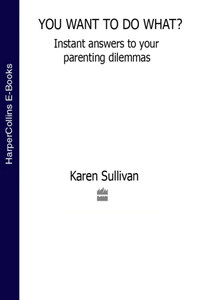CopyrightThorsons
An imprint of HarperCollinsPublishers Ltd.
1 London Bridge Street
London SE1 9GF
www.harpercollins.co.uk
First published in 2007 by Collins
Collins is a registered trademark of HarperCollins Publishers Ltd.
Text © Karen Sullivan 2007
Karen Sullivan asserts the moral right to be identified as the author of this work
A catalogue record for this book is available from the British Library
Karen Sullivan asserts her moral right to be identified as the author of this work. All rights reserved under International and Pan-American Copyright Conventions. By payment of the required fees, you have been granted the nonexclusive, non-transferable right to access and read the text of this ebook on screen. No part of this text may be reproduced, transmitted, downloaded, decompiled, reverse engineered, or stored in or introduced into any information storage retrieval system, in any form or by any means, whether electronic or mechanical, now known or hereinafter invented, without the express written permission of HarperCollins ebooks
HarperCollinsPublishers has made every reasonable effort to ensure that any picture content and written content in this ebook has been included or removed in accordance with the contractual and technological constraints in operation at the time of publication
Source ISBN: 9780007254378
Ebook Edition © FEBRUARY 2017 ISBN: 9780007556632
Version: 2017–03-16
Introduction
There is no one more persuasive than a teenager with an agenda, and certainly no one more capable of making a parent feel inadequate or behind the times. Conscientious parents regularly fall victim to the supreme negotiating skills of their offspring, and have to adjust their own beliefs, values and moral codes in order either to keep the peace or fall in line with current trends. After all, times change, don’t they? Perhaps the way we were brought up is outmoded, and children can and should be allowed different sorts of freedoms and liberties, different levels of independence and trust, and a different role within the family.
There can be no parent in the land who has not heard regular wails of:
I am the only one not allowed...’ (to stay out late, walk to school on my own, take the bus into town, have my own bank account – add your own to this).
The only one who doesn’t have...’ (new trainers, a TV in my bedroom, a mobile phone with a camera, my own room, parties, pierced ears, a tattoo...).
The
only one who has to...’ (clean my room, work for my pocket money, visit my grandparents, have my homework checked, do my own laundry, be accompanied to the doctor...).
The lists are seemingly endless, and from the word go, parents are put in the awkward position of trying to work out if their demands, expectations and rules are fair and realistic, or if they are, in fact, creating social lepers by denying their children the norms of today’s society.
There is no central database of currently acceptable thinking and practice when it comes to parenting. Indeed, most parenting manuals stop well short of the years when parents actually need the most advice. These days many parents are isolated and have less contact with others parents, the result of increased independence, and the fact that many parents work during the day. Couple this with frustration engendered by the impossible task of trying to glean information or make conversation with an adolescent – and it becomes obvious why we’re often working in the dark when it comes to parenting.
It’s no good relying on age-old wisdom handed down from our parents, either. Most of us will remember the irritation of being told that rules were rules, that things were ‘always done that way’, because: ‘that’s how I was brought up, so that’s how you will be too’. Many of us have chosen to forge our own path on the parenting front, and to make decisions based on our individual children and their capabilities, needs and demands, rather than create rules for the sake of them. But this too can be a minefield – one ill-chosen step off that path and a child could be in serious trouble, well out of his or her depth.
So how do we make these decisions? As parents we have a responsibility and, indeed, an innate desire to raise happy, healthy, responsible children, and to invest in them the skills, morals, values and common sense that will take them into adulthood. On one shoulder we carry the weight of this responsibility, and on the other, an overwhelming catalogue of adolescent propaganda.














